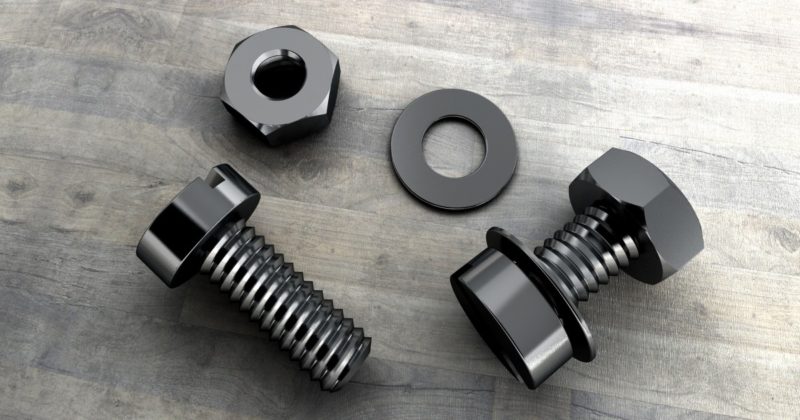What does a lock washer do? It keeps the bolts and nuts from creating a loose. It comes in different models, with each intended use for a specific application. Other lock washers look the same as rings with uneven ends, while some look like a star featuring an outer teeth ring.
Moreover, the lock washer helps prevent bolts and nuts from slipping, turning, & also from coming loose due to torque and vibration.
The lock washer functions in possible ways, but the goal is to hold the bolt and nut. They also achieve the function of biting into the bolt as the base material and nut with the ends.
How A Lock Washer Does Its Job?
So, what does a lock washer do? The lock washer works as it exerts its downward tension. You will notice there is no complete & circular shape with this one. But the conventional washer usually is circular, but the former has a slight and different shape.
It features a semi-raised form of circular metal and a spiral design for its locking action.
The spiral design enables it to work the same way as the spring. The spring, on the other hand, exerts tension after being exposed to pressure. The lock washer also has the same character trait as it exerts stress. Nut twisted onto the bolt will press adjacent to the lock washer, creating pressure to secure the bolt accurately. It may be helpful to read how to use a washer machine.
Series Of Applications of Lock Washer
Specific industries like transportation-related to marine, aircraft, and automotive use lock washers. Moreover, household appliances use it in air handlers, clothes washers, or washing machines. It is useful in applications like slippage of the fasteners and vibration.
Lock Washer And Its Types
Here are the different types of lock washers.
● Helical lock type of washer
Some would call a helical lock type of washer a split washer, wherein it is the same as a ring having uneven ends. Now, these ends bite easily into the fastener material so that it keeps on turning.
● Internal-tooth type of lock washer
The internal tooth type of lock washer has its teeth on the interior part of the ring while it connects with the small fastener head.
● Pyramidal-type of lock washer
This lock washer helps handle projects that demand high-tightening torques.
● Countersunk type of lock washer
This lock washer is functional with oval heads or flat screws with eighty-two or one-hundred degrees of countersunk angles.
● External or internal or combination lock
This lock washer has teeth on the interior and exterior part of the ring, achieving better security with big fastener heads.
● Dome type of lock washer
This type of lock washer fairly distributes the load on a wide area and is helpful for soft or thin materials requiring high torque.
● Dish lock type of washer
This washer is the same as the domed lock type of washer, only that you can use it in applications that require less load or torque.
Common Materials Lock Washer Is Made Of
Lock washers are manufactured with stainless steel, aluminum, zinc, bronze, K-monel, carbon steel, and phosphor bronze alloy. These materials help prevent it from breaking, thus losing its fastening strength.
Uses of Lock Washer
A lock washer is needed if the fastener assembly is subject to vibration or for any back-off. Using a washer with a bolt should fall between the nut and the installation material. It may be helpful to know what is a purpose of a lock washer.
Best Lock Washers To Find
The most effective lock washers are the anti-vibration solutions as mechanical washers and anaerobic adhesives. The Nordlock washer was also more efficient and easy to install than any standard washer. Plus, it is easier when installed than any contender.
Lock Washer Also Need Replacement
K-lock nuts are the same as “sems” with such a pre-assembled type of lock washer. It is often conical and is an external tooth. If the washer or nut is damaged, then you should replace them both.
Tips On How To Choose A Lock Washer
Buy a lock washer featuring an external tooth design with large and more giant nuts and bolts. The bolt heads and larger nuts are placed more efficiently with a lock washer. There is a need to place the teeth outside the washer. Now, the outer tooth design will provide an excellent gripping surface. It may be helpful to read how to choose the correct lock washer.
Lock Washer Use To Protect The Surface
The lock washer prevents or reduces loosening. Similarly, it helps protect the surface of assembled parts with a bolt head or nut that can mar the hole’s surface during the tightening. The washer will then receive more abuse than the part.
Reason Why It Is Called Lock Washer
The name lock washer exists because of its cut. Unfortunately, the two sections against the “cut” misalign with the direction vertical to the surface of the washer.
It’s A Wrap!
Now you have already learned what does a lock washer do whereas it serves much of its purpose to a series of applications. Discussed already are its types, common materials used, and many more. That sounds convincing to pay attention to it more so that your washer will function at its best! Replace it too if it is worn out or old already. Thank you for reading this article!

